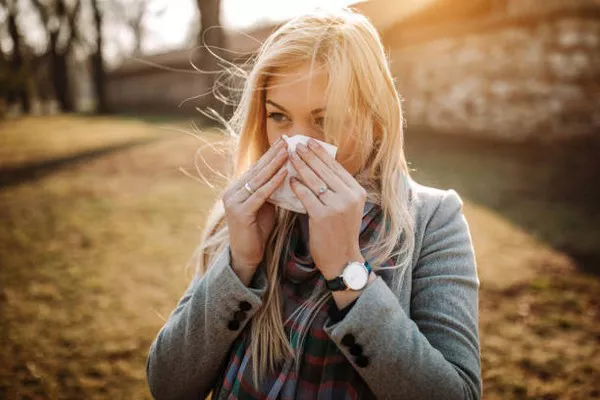Allergies, often marked by incessant sneezing, runny nose, and watery eyes, can cast a shadow over daily life, making the simplest tasks feel like Herculean feats. While conventional medications offer relief, an increasing number of individuals are exploring natural approaches to tackle allergies. In this comprehensive guide, we unveil an array of strategies designed to put the brakes on sneezing and offer respite from allergy-related woes, all without the reliance on pharmaceutical interventions.
Understanding the Allergy Menace: Sneezing as a Symptomatic Prelude
Before delving into natural remedies, it’s crucial to comprehend the adversary at hand – allergies. Sneezing, a hallmark symptom of allergies, is the body’s response to allergens such as pollen, dust, pet dander, or certain foods. The immune system perceives these substances as threats, triggering the release of histamines and other chemicals that lead to the familiar cascade of symptoms.
Strategies to Halt Sneezing Naturally
1. Nasal Irrigation: Rinsing Away Allergens
Nasal irrigation, an ancient practice with roots in Ayurveda, involves flushing out nasal passages with a saline solution. This age-old technique is renowned for its efficacy in clearing nasal congestion, reducing sneezing, and alleviating allergy symptoms.
Procedure:
Prepare a saline solution using distilled water and non-iodized salt.
Use a neti pot or a nasal irrigator to gently pour the saline solution through one nostril and let it flow out of the other.
Repeat on the other side.
Caution:
Ensure proper sterilization of the neti pot or irrigator to prevent infection.
Use distilled or boiled water to avoid introducing contaminants into the nasal passages.
2. Honey: A Sweet Antidote to Allergies
Raw honey, celebrated for its myriad health benefits, emerges as a sweet antidote to allergies. Local honey, in particular, contains traces of pollen from the area, acting as a natural immunotherapy agent.
Usage:
Consume a teaspoon of local raw honey daily.
Incorporate honey into beverages, such as tea or warm water with lemon.
Note:
Avoid giving honey to children under the age of one due to the risk of botulism.
3. Quercetin: Nature’s Antihistamine
Quercetin, a flavonoid found in certain fruits and vegetables, possesses potent antihistamine properties. Including quercetin-rich foods in your diet or opting for supplements can mitigate allergic reactions.
Sources:
Apples, onions, citrus fruits, and berries.
Leafy greens like kale and spinach.
Supplement Caution:
Consult healthcare professionals before incorporating quercetin supplements, especially if on medication.
4. Essential Oils: Aromatic Allies in Allergy Defense
Essential oils, extracted from plants, harbor compounds with anti-inflammatory and antiallergic properties. Inhalation therapy using essential oils can provide relief from sneezing and congestion.
Essential Oils:
Peppermint: Eases nasal congestion.
Lavender: Calming and anti-inflammatory.
Eucalyptus: Clears respiratory passages.
Application:
Diffuse oils at home.
Add a few drops to a bowl of hot water and inhale steam.
5. Butterbur: Nature’s Respiratory Reliever
Butterbur, derived from the Petasites hybridus plant, has demonstrated efficacy in relieving allergy symptoms. Its anti-inflammatory properties make it a natural ally in the battle against sneezing and nasal discomfort.
Usage:
Choose standardized butterbur supplements.
Follow recommended dosage guidelines.
Caution:
Seek professional advice before using butterbur, especially for prolonged periods.
6. Probiotics: Gut Health, Allergies, and Sneezing
The gut plays a pivotal role in immune function, and maintaining a healthy gut microbiome can influence allergy susceptibility. Probiotics, beneficial bacteria, contribute to gut health and may mitigate allergic reactions.
Probiotic Sources:
Yogurt with live cultures.
Fermented foods like kimchi and sauerkraut.
Supplement Consideration:
Explore probiotic supplements for a concentrated dose.
Crafting an Allergy-Friendly Lifestyle: Beyond Remedies
1. Allergen Avoidance: A Strategic Retreat
While it might seem obvious, minimizing exposure to known allergens is a fundamental strategy for preventing sneezing and allergic reactions. Simple lifestyle adjustments can create sanctuaries of relief.
Tips:
Invest in allergen-proof bedding.
Regularly clean and vacuum living spaces.
Keep windows closed during peak pollen seasons.
2. Dietary Modifications: Fueling Allergy Resilience
Beyond specific allergy-fighting foods, adopting an overall anti-inflammatory diet can fortify the body against sneezing and allergic responses.
Dietary Recommendations:
Emphasize fruits, vegetables, and whole grains.
Limit processed foods and added sugars.
3. Hydration: Nature’s Cleansing Mechanism
Adequate hydration is a cornerstone of overall health and can play a role in managing allergy symptoms. Proper fluid intake supports the body’s natural detoxification processes.
Recommendations:
Drink plenty of water throughout the day.
Opt for herbal teas to enhance hydration.
4. Stress Management: A Shield Against Allergy Aggravation
Stress can exacerbate allergy symptoms, including sneezing. Implementing stress-management techniques, such as mindfulness and meditation, can act as a shield against heightened allergic responses.
Practices:
Yoga and deep breathing exercises.
Adequate sleep for overall well-being.
See Also: How to Tell If You’re Allergic to Your Laundry Detergent
Conclusion:
In the quest to halt sneezing allergies naturally, a multifaceted approach emerges as the key. Incorporating these natural strategies into daily life, coupled with an understanding of individual triggers, can pave the way for sustained relief. While pharmaceutical interventions remain a valuable resource, embracing the power of nature offers a holistic and balanced approach to managing allergies and regaining control over a sneeze-free existence.


